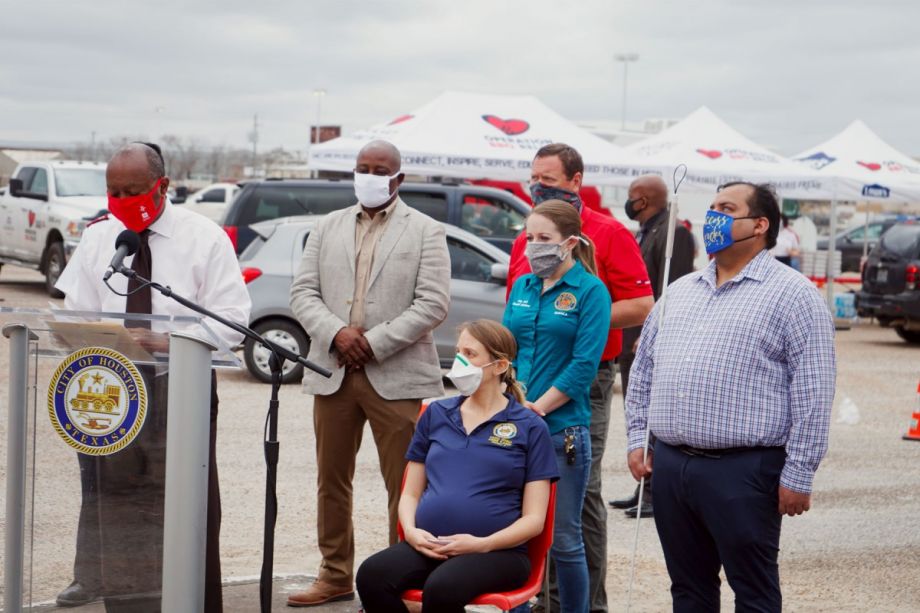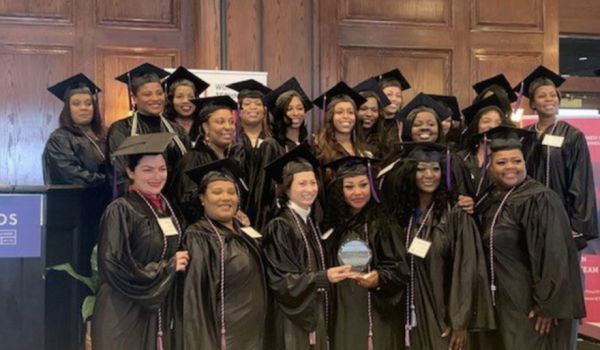Originally published by The 19th.
Abbie Kamin could not keep food down. She was hit with bouts of debilitating pain. Some days, she could barely get out of the bed.
Yet all the while, Kamin worked.
It was a rough first trimester, but the global pandemic offered a strange silver lining for the Houston city council member: Kamin spent last summer joining council meetings from bed. During the worst of her morning sickness she disabled video, even though it made colleagues suspicious. Texts came in: Why is your camera off? But she wasn’t ready to share that she was pregnant.
“Whether you’re in office or not, pregnancy is not talked about enough openly, publicly — the good, the bad, the ugly,” Kamin said. “Growing up, pregnancy was just, ‘Beautiful … you’re glowing! Oh, it’s this amazing thing!’ Meanwhile, I’m literally bedridden for three months straight.”
It’s been an eventful first term for Kamin, who was elected in late 2019. During her first month in office, an explosion at a manufacturing building in northwest Houston killed three people and injured more than a dozen, damaging hundreds of homes and businesses. Two months later, the first cases of COVID-19 were detected in the city. There were summer protests over racial injustice in Houston, which George Floyd called home for several years. Days after announcing her pregnancy in September, Kamin was sharing alerts with constituents through emails and social media about a tropical storm causing severe street flooding.
“It’s probably been one of the most challenging 15 months of any city council,” said Sylvester Turner, the mayor of Houston. He noted Kamin was pregnant for a large part of it. “It demonstrates that she’s very capable.”
But through all of this, Kamin wondered what she would have done if meetings had been held in person. Would she have had the physical energy to attend? Would she have bolted repeatedly from the room to throw up? And what about city of Houston employees who are pregnant? What happened if they had severe morning sickness, which can impact a pregnant person’s ability to work? She recognized virtual video calls wouldn’t always be an option. For some, it never was.
“That really is what kind of set me off on these months of exploration and work,” Kamin said. “Thinking about how women just get through this, and are expected to just deal with it.”
Kamin, 33, is the first pregnant person to ever serve on Houston’s city council. There have been parents — some currently on the council — but she was pregnant while crafting policy, giving her an even more unique outlook on what it means to help run America’s fourth largest city.
“There’s a lot that, until I was pregnant, I didn’t know to even look at or ask for,” Kamin said. “Now that I’m in the middle of it, I’m like, ‘Wait, what do you mean we don’t do this?’”
Across the country, the pandemic has laid bare the longstanding inequities for people navigating pregnancy while working. Pregnancy-related benefits and accommodations vary from job to job, with recommendations for how businesses implement those benefits often set by policymakers through state laws and local ordinances.
Kamin wanted to use her position to help city employees who are pregnant and their families. She wasn’t sure how it would play out, but she wanted to try.
The 19th spoke with Kamin over several months as she tried to figure out her role in shaping policies for the city of Houston around pregnancy and gender equality. She dealt with the realities of being pregnant during an unprecedented global pandemic — isolated from her family and friends during one of the most vulnerable times of her life.
“I’m fortunate to have a job where I can use my voice to shine a light so other women can also step forward and speak out,” she said. “Millions and millions of women are not in a position where they can work remotely when they’re dealing with debilitating morning sickness … I think that we as women in general, but pregnant women specifically, have rights and needs, and we shouldn’t be afraid to seek accommodations for those.”
How much does prenatal care like doctors’ visits cost? Which medical needs are considered preventative care and covered by insurance? How much would it cost to deliver at a nearby hospital?
In those first months of pregnancy, Kamin said she found herself on the phone repeatedly with her insurance provider seeking answers, sometimes for hours at a time.
“There’s just all these little things, but then they start to add up,” she said in September, when she was at least 12 weeks pregnant. “The past few weeks with the ultrasounds, the testing, the lab work. It’s been trying to navigate the health care system, which is completely broken.”
Kamin had other factors to consider: As a council member, she is not considered a city employee, but she is eligible to enroll in the city’s benefits plan. However, several months into her pregnancy, she still wasn’t completely sure what worker benefits she’s entitled to — including how much parental leave she could take.
Kamin acknowledged the unique privileges of being an elected official, someone with easy access to information and the time she needed to seek it. If things felt confusing to her, what was it like for others?
“This hasn’t been about me, but about the voices of other women — employees of the city who have gone through this — but also for the sake of future employees and women who want to run for office,” she said. “We have to be talking about this.”
The United States is the only industrialized country in the world without a federal system that requires employers to offer paid leave for a parent to take care of a newborn or adopted child. The quality of a person’s family leave benefits in America depends entirely on where they work.
American workers are eligible to take 12 weeks of unpaid time off per calendar year under the Family and Medical Leave Act, the 1993 federal law that provides America’s employees protected unpaid time off for medical recovery or other reasons, including the birth or adoption of a child.
FMLA has exemptions: People who work at a business for less than a year do not qualify; neither do people who work somewhere employing fewer than 50 people. That means only about 60 percent of the workforce across the country is eligible for the federal program. And just because it’s available does not make it feasible. Data shows about 10.9 million workers each year need leave but do not take it. Two-thirds — almost 7.2 million workers — say it’s because they could not afford to go without pay.
As of March 2020, 20 percent of private industry workers and 26 percent of state and local government workers had access to paid family leave, according to the U.S. Bureau of Labor Statistics.
In recent years, lawmakers in a handful of states have enacted varying paid family and medical leave programs. Just four states had such plans in 2016; it was up to nine and the District of Columbia by 2020.
“Local government leaders have been making great strides in the last number of years to expand access to paid leave for municipal and state employees,” said Jessica Mason, a senior policy analyst and engagement manager for workplace programs at the National Partnership for Women & Families, which has tracked some local policies.
According to the city of Houston, a council member does not qualify for FMLA because they are not technically a city employee. But Kamin quickly began to understand the reality for the city employees who surround her: The city of Houston has no paid parental leave policy for its employees — workers rely on unpaid parental leave benefits they qualify for under FMLA.
Other cities have taken action to address this issue. The mayor of New York City announced an executive order at the end of 2015 that put a six-week paid parental leave policy in place for city workers — up to 12 weeks total when combined with existing leave. The New York state legislature followed with a paid family leave law that has expanded to up to 12 weeks of paid family leave at partial pay (many unions representing city employees have bargained for paid leave rights under state law). In Chicago, women are able to take four to six week of paid leave after giving birth; adoptive parents are eligible for two weeks, and partners and spouses one week. Los Angeles will offer up to six weeks of paid time for parental leave following a vote this year by its city council.
Gridlock in Congress and state legislatures means cities have sometimes been at the forefront of family-friendly work policies, Mason said.
“It’s really important to keep in mind that paid family leave is incredibly popular policy, across every demographic characteristic, across partisan lines,” she said. “Lawmakers who want to tackle this problem are doing something that their constituents support and want to have happen.”
When Elizabeth Brown decided to run for city council in Columbus, Ohio, in 2015, she was seven months pregnant with her first child. She gave birth to her daughter two weeks before the election.
Within a few years in office, Brown helped enact a policy for city employees that allotted up to six weeks of paid parental leave following the birth or adoption of a child, and up to four weeks of leave to primary family caregivers at 70 percent of normal pay. Neither benefit existed before.
“I knew firsthand that there was a gap,” said Brown, who was a city employee before she joined the council. “That was kind of taken directly from my personal experience, and I applied a solution when I got into office. I’m proud of it … I got through what I could, but it should be longer and more generous, and there’s still work to be done. But I hear from, and work with, mothers and fathers every day in the city who have used it.”
In Seattle in 2019, two council members became the first pregnant people on the city council. One of the council members had helped pass legislation in 2017 to expand the city’s paid parental leave to 12 weeks, a benefit they both could later use after their deliveries.
The real-world experiences of elected officials navigating pregnancy and parenthood has consequences for policy, said Liuba Grechen Shirley, founder of the Vote Mama Foundation. Grechen Shirley received national attention in 2018 after the Federal Election Commission approved her request to use campaign funds for child care for her young children. The first-time ruling led dozens of people to seek similar approval for child care needs.
“When you have legislators who understand these issues because they’ve lived them, it’s their personal experience, it changes the conversation at the table,” she said.
In 2017, a pregnant council member in New York City gave birth to a baby boy. The next year, she spearheaded efforts to require employers to expand parental accommodations including lactation rooms. In Pittsburgh in early 2019, a pregnant council member helped add pregnancy as a protected class in workplace discrimination cases, noting that her own pregnancy had heightened her awareness of the need for more legal protections.
Wracked with morning sickness, Kamin wondered about other pregnant people within the ranks of the city’s nearly 22,000 employees. What benefits did they have to take time off from work or to work from home if they felt as sick? How much parental leave were they entitled to? Were there gaps in coverage needs?
“I can only know what my experiences are,” she said. “I have to talk to others to really get theirs.”
In Houston, city employees are able to participate in a program that allows them to donate accrued vacation leave to a specific employee for various medical needs. But morning sickness is not covered under the rules of the share program. Kamin is now looking to change that.
“One of the things I’ve learned from all of this is that women have really had to grin and bear it,” Kamin said. “In the back of my mind the whole time was, ‘How do women do this?’”
***
Kamin has been interested in public service most of her life.
She remembers her dad taking her to vote, instilling an early appreciation for civic engagement. In 2000, on a school trip to Washington, D.C., a 13-year-old Kamin watched protests outside the U.S. Supreme Court as Bush v. Gore was being decided.
“That’s really where I fell in love, in a weird way, with elections and making sure that every single vote counts, that every voice is heard,” she said.
Kamin grew up in Houston. At her Jewish parochial high school, Kamin said lessons around the tenets of repairing the world and helping others stuck with her, especially during class volunteer projects. As a college student at Tulane University in New Orleans, her move-in day coincided with a city evacuation ahead of Hurricane Katrina, a destructive storm system that led to at least 1,100 deaths. A system of levees failed, exacerbating the scope of flooding in the city. It was jarring for her to see government collapse at every level.
“It shattered a lot of my beliefs and perceptions, and really drove me into focusing on local government as the mechanism for really being there for people,” she said.
Kamin went on to study law at American University and worked on civil rights issues as Houston’s associate regional director for the Anti-Defamation League, also working on voting rights issues and litigation as an attorney. But she wanted to pursue the legislative side of things. When term limits were up for her predecessor on the city council, she jumped into a crowded race for the open seat for Houston’s District C. She ultimately prevailed over more than a dozen people. She now represents more than 230,000 constituents on the 16-member council.
In late June, months into her first term on council, Kamin found out she was pregnant with her first child. She had known that she wanted to start a family, and she didn’t want to wait. She has an endometriosis diagnosis, which can cause a host of health concerns including fertility issues.
It was in the middle of the pandemic, and Kamin quickly realized that this pregnancy would look far different than she expected. But she was excited. She surprised her husband, Matt, by purchasing a little kids’ glove and baseball.
“I wrote on the baseball, ‘I can’t wait to play catch with my dad,’” she said, noting the couple’s love of the sport.
At the end of her first trimester, Kamin announced her pregnancy to constituents in an email and social media posts. Kamin’s formal announcement included a statement acknowledging the mothers on the council and those who had served before.
“Going through this, I’m learning what it’s like to balance family, a full-time job and career, my civic duties, and pregnancy all at the same time — but there are bold working women who have paved the way for me,” she wrote.
People were overwhelmingly positive, sending congratulatory emails, texts and other messages. Still, Kamin felt nervous. One person asked Kamin if she planned to quit her job on the council. Another suggested she start putting family before work.
“There were a few insinuations of, ‘How are you going to do this? You’re already doing so much,’” she said.
Kamin insisted the people were well-intentioned. But it touched on an internal fear of hers.
“My concern, or my nervousness, came from people relating to me like I wasn’t going to continue to do my job, or I wouldn’t take it as seriously, or that I wouldn’t be capable of doing it once I have the baby,” she said.
A Pew Research survey from 2018 showed 51 percent of Americans believed it was better for a woman who wants to reach high political office to have children before entering politics. About a quarter (26 percent) said it would be better for the woman to wait; 19 percent said a woman would be better off not having children if they sought higher office.
Over the years, more candidates have run for office while pregnant, or spoken more openly about being parents of young children. The acceleration has been particularly pronounced after 2018, dubbed “the year of the mother.” U.S. Sen. Tammy Duckworth of Illinois, only the tenth member of Congress to give birth while in office, that year became the first senator to bring her newborn to the chamber floor for a vote. That fall’s election, several mothers proudly brought their young children on stage to celebrate their political wins. A handful of single parents of school age children are now serving in Congress.
That progress has been hard fought. Jane Swift was 15 weeks pregnant in 1998 when she announced her plans to run on the Republican ticket for Massachusetts lieutenant governor. She remembers telling her mother about the campaign.
“I said, ‘Oh, it’s going to be a short campaign, only nine months. Like how bad could it be? And then I proceeded to throw up almost every day for the next nine months,” she said.
Swift said her growing belly quickly became a story on the campaign trail, with some questioning whether she should be running at all. Those persisted once Swift was elected: Where was her daughter? Why wasn’t she with Swift at work? Why was she with Swift at work? What did child care look like? Why was her husband the one staying home?
“Almost every personal decision that we and every family struggle with, we were asked publicly and privately incessantly,” she said.
A few years later, Swift became the state’s first woman governor when then-Gov. Paul Cellucci stepped down for a White House role. Swift became pregnant again, this time with twin girls, and was the first governor in the country to give birth while in office. Swift said she was continuously surprised by the attention on her motherhood. She felt it took away from her policy priorities on issues like education and the economy.
“I often expected that the progress that had been given lip service publicly actually existed in practice,” she said. “And my experience often proved that that wasn’t yet the case.”
Amanda Hunter, executive director of the Barbara Lee Family Foundation, said the conventional wisdom several decades ago was for women candidates to fit into a template designed with men in mind. If a person was pregnant back then, they might have been encouraged to wait before running for office, or would be encouraged not to talk about it so much on the campaign trail.
“What’s different now is women are just using their lived experience to inform the way that they would do the job, and the perspective that they will bring to the job,” she said. “By all accounts, that authenticity really resonates with voters.”
In 2018, Zephyr Teachout was pregnant with her first child when she announced her run for the Democratic primary for attorney general of New York. One of her digital ads included a video of her sonogram. Other candidates have since released gubernatorial ads that show them breastfeeding.
In statehouses, lawmakers like Republican Rep. Megan Jones of Iowa and Democratic Rep. Josie Raymond of Kentucky in recent years brought their newborns to state capitols for votes and committee meetings. Last summer, Assemblywoman Buffy Wicks, a Democrat in California, highlighted a policy gap in proxy voting that effectively forced her to bring her newborn to the state Capitol for a vote, where she held a crying baby on the chamber floor.
Kamin knows that she is part of a generation of elected officials changing perceptions around when to start a family while having a political career.
“What I would love to do is just be able to open up for other women the opportunity to talk about pregnancy, and the support that is needed for women in pregnancy, but also making sure that women know that they can be pregnant, they can have a young family, and still be an elected official or still be involved in government and that there is a space for them,” she said.
Swift, the former governor in Massachusetts, said Kamin’s public journey will make a difference for other women. Young women have approached Swift to tell her that her pregnancy gave them the confidence to pursue politics while knowing motherhood could work.
Swift said she would do it all again, and she had advice for Kamin and other pregnant elected officials for the hard moments to come: “Don’t take that burden onto yourself, that you have to make it look perfect. Because even the imperfections have a huge impact, that you’ll probably never know, for girls and young women like my daughters.”
***
Kamin was on a fact-finding mission.
She wanted to find city employees who would talk to her openly about their experiences with pregnancy. She reconnected with one person she had worked with in the past, agreeing to let the employee talk anonymously. That trust led the worker to connect Kamin with others. Over a few weeks in January and February, Kamin said she had half-hour calls with a handful of city employees.
One of those employees was Monica Vasquez, who works in the city’s public works department and gave birth to a child in 2019. Vasquez said it can feel daunting to talk to an elected official, but she felt at ease talking to Kamin. She listened intently, Vasquez said, only periodically chiming in to offer her own personal experiences. (Vasquez did not specify what she shared with Kamin.)
“She’s using her personal experience to understand other women’s experience, to have that open dialogue about how things are working for women right now in the city of Houston,” Vasquez said. “For her to take this on among all the other things, it’s just remarkable.”
The need to talk about pregnancy accommodations has been necessary, said Annise Parker, who served as Houston’s second woman mayor from 2010 to 2016. Before serving as mayor, Parker — then the city’s comptroller — enacted flexible work schedules for her staff just as she and her wife brought home a baby.
Parker told The 19th that during her time as mayor, she handled human resources issues involving employees who attempted to discriminate against pregnant workers. Pregnancy discrimination claims filed with the federal government increased by 50 percent between 1997 and 2011, though more recent data shows a decrease in recent years. A spokesperson for the federal agency that tracks the data said there isn’t more information available about the drop.
“Even though the laws are in place … the mindset is still there as if pregnancy were a disability,” Parker said.
Still, she understands that there are priorities that often take precedence over things like implementing family-friendly policies. When she oversaw Houston, there were huge budget deficits from the recession, which she noted was a reality for government municipalities around the country. Although Parker recognized that the pandemic could put further strain on local budgets, she said it might also be the very reason that local officials should prioritize family-friendly policies.
“If there’s a time to really look at what is the holistic policy of the city for how we accommodate employees with small children, that this would be the opportunity to do it, and there would be political and public support for making change,” she said.
But, Parker added: “There’s only so much bandwidth, so someone has to champion it.”
Kamin, who may very well be that person, said Parker’s experiences underscore the importance of having more women and mothers of young children in office — and that it’s important for allies, including men, to speak up when they see or hear wrongdoing around treatment of pregnant employees.
“It’s incumbent upon all of us, including elected officials, to start talking about this and normalizing this,” Kamin said.
As she talked to city employees, Kamin was also working on her proposal to create a women’s commission — a private-public partnership of leaders who could focus on a range of issues including employment and wages; health, including leave benefits and other accessibility issues; safety, including domestic violence; and other intersectional topics.
Kamin called Beth Merfish, whom she had met through a political leadership training program a few years ago, to see if she would help make the commission a reality. Kamin described Merfish, an associate professor of art history at the University of Houston-Clear Lake, as an “incredible advocate and mom” who really cares about women’s equity issues. Merfish remembers being surprised at Kamin’s suggestion to help — she wondered if someone else might be better positioned to do the work. But Kamin insisted.
“She is someone who looks around her for ways to promote other women,” Merfish said.
Amid the pandemic, daily work and life responsibilities, the two organized a series of calls during the second half of 2020 to hash out ideas. They wanted to get council approval to create a permanent commission that would not dismantle if there was a change in the mayor’s office.
Around Thanksgiving, Kamin and Merfish met virtually with Mayor Turner and his chief of staff. The two women had submitted a detailed proposal ahead of the meeting, envisioning a commission of people from different sectors in the city including health and business. Every year, the commission will have different objectives to address. Within minutes, Turner informed the pair that he was on board. It was the most “functional” meeting Merfish said she had ever witnessed.
“You do want it to be a no-brainer that there should be a women’s commission,” Merfish said. “It was just very clear that [Turner] really respects her opinion.”
Kamin recognizes that she is lucky. While the city council is nonpartisan, she and a majority of the council identify as Democrats, as does the mayor. Kamin also has a good working relationship with Turner, giving her more opportunities to direct public policy in a way that officeholders in other areas of divided government may not.
“It takes partnership,” she said. “It takes coordination.”
Kamin and eight other women made history in 2019 when they were elected to the 16-member council, making it the first time the legislative body was women-majority in years. Turner said that has had an effect on what policies are advancing, and that Kamin’s pregnancy has made a difference.
“She can certainly speak from a very personal perspective about what other employees have gone through, what other city employees are going through right now, and then what their experiences will be after,” he said. “And it makes us all acutely aware. It makes me even more keenly aware of the need to address these issues in real time.”
Kamin sat still, her left sleeve rolled up, as the nurse at the La Nueva Casa de Amigos Health Center prepared to administer her first COVID-19 vaccine shot. Cameras readied to capture the moment.
Kamin was eight months pregnant that mid-January morning. Her feet were swollen and she felt tired, but a face mask covered any visible discomfort. Kamin had invited press to the clinic, hoping other pregnant people might read or watch the coverage and consider whether to get shots, too.
“Like anything you do during pregnancy, you’re worried about what you are putting into your body,” she said ahead of the appointment. “I just want to make sure that women who want to get the vaccine, know that other women are getting it.”
The educational opportunity would have to wait. The nurse, after a brief questionnaire, informed Kamin that a prenatal vaccine she had just received would delay her COVID-19 shot by a week. Kamin was disappointed — but she decided it could still be a public lesson about vaccination preparedness. She made that very point minutes later at the clinic to reporters, as she gently held onto her belly.
“It showed that the system is working, and how rigorous and diligent — not just the nurses are — but the rules are,” Kamin later said. “It reinforced my confidence that this is safe.”
When Kamin returned to the clinic, she brought a handful of pregnant and nursing people so they could all get vaccinated together. At one point, Kamin took out her phone and began recording a Facebook Live video, highlighting the risks of COVID-19 for pregnant people.
Kamin’s message is always the same: The risk of contracting COVID-19 as a pregnant person is serious. With proper consultation from their doctors, pregnant people can safely get vaccination shots.
“We’re encouraging all women to talk with their health care provider, to get the facts and get the vaccine,” she said.
Kamin has become Houston’s de-facto COVID-19 spokesperson for pregnant people. She said her office has fielded questions and concerns through emails and sometimes text messages.
“They say, ‘Can you send us some information? My sister’s pregnant and she’s really nervous about getting the vaccine,’” she said.
Kamin tried to make the best out of unexpected circumstances. She had hoped the public health crisis would not last as long or as intensely as it has. She primarily stayed home during her pregnancy, to protect herself and her baby from the additional risks of the virus on pregnant people. She stayed away from her parents and held a virtual baby shower.
“You do what you have to do to protect yourself, your family and also set a good example in the community,” she said.
In the final weeks before giving birth, a vaccinated Kamin gave her father a hug, the first time she had done that with a baby bump, calling it “one of the best moments” in her pregnancy.
In February, just weeks before Kamin went into labor, severe winter storms in Texas knocked power and water out in her home and the neighborhoods she represents. It was a stark reminder for Kamin of how much has been out of her control during the pandemic.
At one point, a pipe in Kamin’s attic burst while her husband was out helping a family member. Kamin, nine months pregnant, waddled up and down the stairs to examine the damage, at one point kneeling on the ground to figure out how to turn off her home’s main water valve.
Several rooms sustained damage, including the forest-themed nursery, which required a deep-clean.
“Having to accept that the plan I had for what I wanted to bring my child home to is not necessarily going to be that right now, that was a lot to take in after the week that I had, on top of everything,” she said.
Kamin had wanted to slow down in the final days before she met her son. Instead, she was focused on helping to organize several days of water and food distribution for her constituents. The work grounded her perspective.
“There are so many more people and residents in my district with greater needs than I have right now, and I have the privilege of being able to help them,” she said. “That’s honestly what’s kept me going through all of it.”
Kamin ultimately took three weeks of parental leave after she delivered a healthy baby boy in mid-March. She has since begun attending virtual council meetings for votes and public sessions. Kamin is back to chairing the Public Safety and Homeland Security Committee; helping with the city’s ad-hoc team on state legislature issues; and preparing for the city’s budgetary process. And her son already has a District C onesie.
The continued virtual world of city government means Kamin has more flexibility than most pregnant people in her position had prior to the pandemic.
Kamin said she has collected several informal testimonials from city employees who have been pregnant while working for the city. She is still sorting how she plans to use the information, but she has already met with the director of the city’s human resources department to make initial recommendations.
“There’s things I’m learning that I’m trying to capture, so that we can work and improve upon them and lay out clear policy,” she said. “It’s a work in progress.”
Kamin said there are tentative plans to look at adding parking spaces for pregnant people and expanding space accommodations for breastfeeding in city buildings (a proposal that has been floating around but one that has picked up renewed interest). She’s also looking at how to help streamline the educational materials shared with city employees who become pregnant or need related care.
“When you’re jumping into this, you have no idea what you’re doing or even what questions to ask. When you’re trying to learn about FMLA, there’s not a lot of information out there,” she said.
Kamin said she’s even looking at creating a separate pool of shared sick time that pregnant city employees can tap into, to make sure their range of medical leave needs are met without impacting allotted time off after a baby arrives. She’s also helped advance conversations about adding more insurance coverage benefits for pregnant people for discount incentives and support like a hotline for pregnant care.
“There’s just so many different loopholes, so many things we don’t think about that aren’t covered, but we expect families to deal with it on their own. And many families can’t,” she said.
The council is expected to vote on the creation of the women’s commission soon — Turner plans to wait for Kamin to be back completely from parental leave given her contributions to it becoming a reality.
One day after her due date came and went, the city council was in session to discuss topics like ordinances, public housing and more winter recovery plans. Kamin logged in from home, as she had throughout her pregnancy. She kept her screen off, until Turner noted that he was surprised she was present. Kamin suddenly appeared, sitting on her couch, her hand on a belly that could not be hidden.
Turner jokingly asked Kamin if she was calling from the hospital. He informally proclaimed it Abbie Kamin Day. Kamin laughed, but she also got down to business.
“We have a few constituents in District C today,” Kamin said of the virtual attendees. “So I wanted to be here for them.”
















